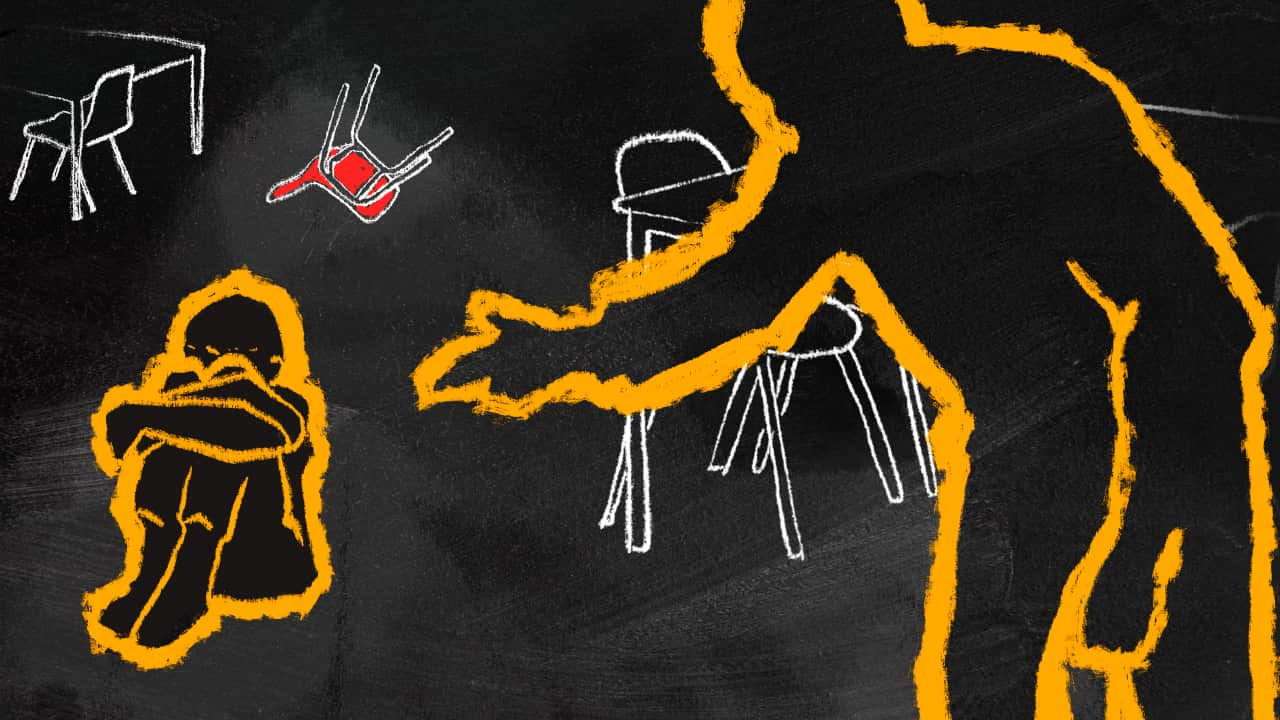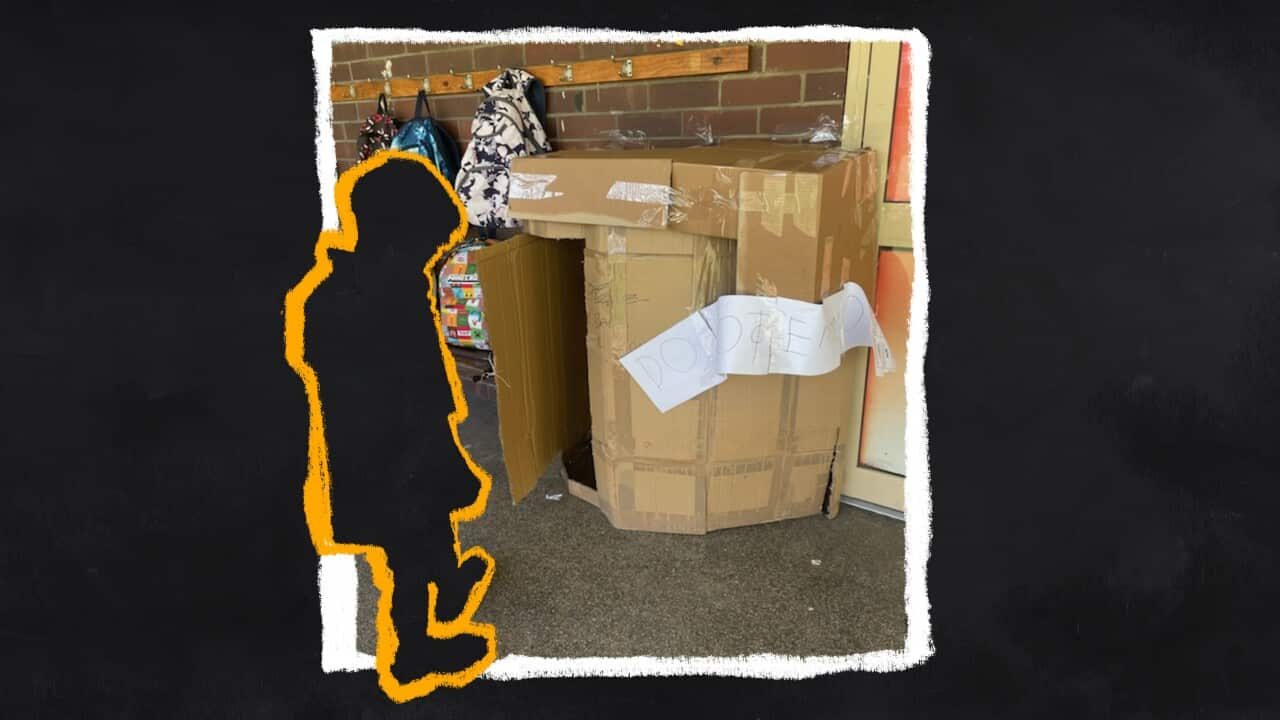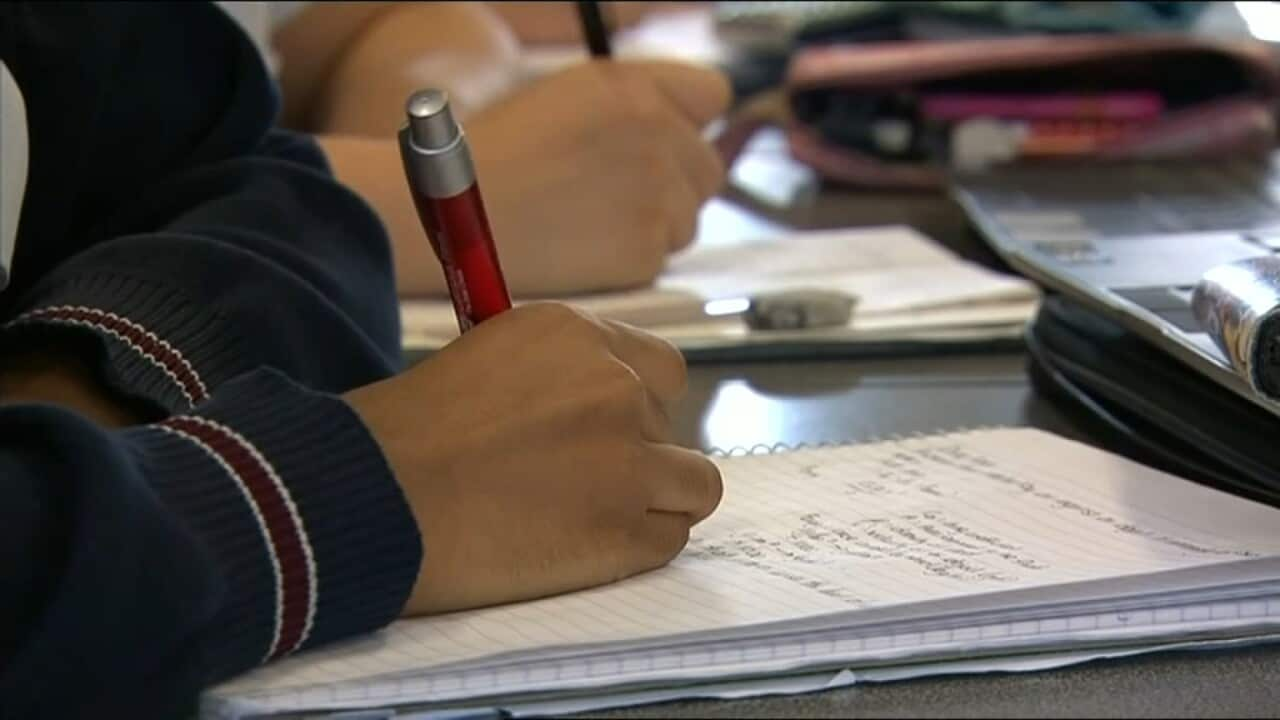

19 min read
Feature
'A miracle that a child hasn't died': Are Australian schools failing children with disability?
In Australian schools, teachers are permitted to physically restrain and seclude students under exceptional circumstances. But parents and experts say the misuse of these practices is commonplace and that children with disability are given 'no credence' when it comes to reporting.
Published 4 November 2024 5:40am
By Zacharias Szumer
Source: SBS News
Image: A staff member at Lang Lang Primary School in Victoria grabbed a first-year student, Ben, by the arm and threw him at a chair, causing the chair to tip back and Ben to hit his head on a table, his mother told SBS News. (SBS News / Jono Delbridge)
Holly is the parent of a first-year student, Ben, whose name we've changed for privacy.
"Ben loves Lego, he loves playing with anything army and trucks and toys, [and is] generally a happy boy," she says.
However, Ben's behaviour started to change after he told Holly about an incident with a staff member at Lang Lang Primary School in country Victoria earlier this year.
"[The staff member] grabbed him by the arm and threw him at a chair, which caused the chair to tip back and [Ben to] hit his head on a table," Holly explains.
The staff member reportedly then said "Stop crying, idiot" to Ben, who has level 2 autism and ADHD and requires a lot of assistance from disability support staff.
At that time, Ben also told Holly that the staffer regularly grabbed his arm or shoulder in ways that hurt him.
Such physical restraints are a type of ‘restrictive practice' — permitted under certain conditions in school settings to prevent imminent harm but which, according to SBS News' findings, are often overused and underreported.

Parents and advocates are calling for governments to step up and protect kids with disability in Australian schools. Source: SBS News / Jono Delbridge
Around two weeks after the alleged incident with the chair, Ben had "a big meltdown" in the morning and refused to go to school. When Holly asked Ben what was wrong, he said he had "been pushed to the ground and kicked to the abdomen" by the same staffer.
SBS News contacted Lang Lang for comment but the school declined to respond, deferring to the Victorian Department of Education.
SBS News understands that allegations of the school's use of restrictive practices in relation to Ben were investigated and not found to be substantiated by the department.
Since opening up about the alleged incidents, Ben has missed meals, is sleeping more, experiencing migraines and having issues with toileting, which Holly believes is "due to the stress and anxiety" of what he says is happening at school.
- This is part two of a two-part investigation. :
Child victims 'not given any credence'
Holly is one of many parents of children with disability subjected to restrictive practices in Australian schools who have been left frustrated and distraught by a lack of transparency and assistance from both schools and state education departments.
SBS News has spoken to dozens of parents who have shared similar testimonies, some of which cannot be reported on due to ongoing court proceedings.
According to data from the Australian Curriculum, Assessment and Reporting Authority, around one in four — or 991,272 — Australian students received educational adjustments due to disability in 2023.
Veteran disability advocate Julie Phillips says she's aware of more than 40 schools in Victoria alone where children with disability have been violently restrained or secluded.
She tells SBS News that one of the barriers faced by parents in reporting the misuse of restrictive practices is that the testimony provided by their children is difficult to substantiate.
"[State education departments do] not allow independent investigations. Terms of reference are often hidden … [and] any lawyers the department brings in allow it to claim that their work is privileged and therefore efforts to see any investigation documents are thwarted," she says.
But most importantly, in breach of the Child Safety Standards, child victims are not given any credence.
"If a child reports abuse, and the staff member denies the abuse, that's good enough for the department. The priority for the department is to protect its staff and its schools."
Transparency and trust
Holly says she has also found it difficult to have her son's allegations substantiated and claims the school has withheld information from her.
On the day Ben was allegedly thrown into a chair, Holly says no information was provided via the school's parent-teacher communication app to suggest Ben attended the sick bay and she didn't receive a call about the incident.
The Department of Education did not respond to SBS News' specific questions about the alleged incident, but said in a statement: "The safety and wellbeing of students and staff is always our highest priority, and our data shows that physical restraint or seclusion is required in only an extremely small proportion of cases each year."

Lang Lang Primary School in Victoria is just one school among many against which claims of excessive and violent restrictive practices have been made. Source: SBS News / Jono Delbridge
"He would bottle it up so much that then he would have to explode and then a new bit of information would come out."
Holly complained to both the school and the Victorian Education Department on 19 May but says both have been reticent to provide details or updates on her case — usually citing privacy or confidentiality restrictions.
The department assigned Holly a community liaison officer (CLO), but she says it's been incredibly hard to connect with them.
In early July — after only speaking to her CLO once, despite multiple attempts to contact them — Holly was advised by the department that the case had been closed.
It has since been reopened and marked as "high-priority". Holly says the newly assigned CLO has shown "no interest in helping".
At the recommendation of the department, Holly, her husband and Ben also met with Victoria Police's child abuse support unit.
After speaking with Ben, police reportedly told Holly they couldn't proceed with the case because her son did not communicate effectively enough to provide testimony.
At this point, the staff member involved was still working at the school, but the principal assured Holly that he would no longer be working in Ben's classroom, so Ben returned to school.
After another incident in mid-July at a matinee school concert — during which Ben encountered the staff member who had allegedly hurt him — Holly decided to pull her son out of school. He's now attending another school and doing "really well", she says.
Shortly after that incident, Holly sent emails to the school principal, the Education Department and the CLO to follow up on the case.
The last contact she says she's had with them was on 26 July.
"I'm still waiting," she told SBS News in early November.
Despite repeated requests for comment, the department did not respond to SBS News' direct questions, but a spokesperson said in a statement: "Physical restraint and seclusion are not permitted within Victorian government schools except in exceptional circumstances where it is necessary to protect the safety of a student or another person."
A data collection deficit
Parents are not the only ones calling out the lack of transparent reporting on restraint and seclusion by state education departments.
The disability royal commission also cited participants' concerns about "reporting, investigating and responding to violence, abuse, neglect and exploitation in education settings".
In response, the commission recommended that "students and parents should expect to be involved in decision making, adjustments and complaints handling and informal resolution processes".
It also recommended that state and territory governments collect and publish data on the use of restrictive practices in schools, including the disability status of students.
Currently, most governments have not implemented the recommendations. The federal government's response to the commission's report, , only accepted the recommendations in principle, saying it was "to improve the collection and reporting of restrictive practices data".
Victoria is currently the only state or territory that both , but it doesn't include the disability status of students.
The ACT, for instance, collects such data but does not publicly release it. Most states don't collate data on the prevalence of restrictive practices at all.
In 2022, the latest year for which statistics are available, the Victorian Education Department reported 1,844 incidents of restraint and seclusion in schools. This includes 1,427 incidents in primary schools, 395 incidents in secondary schools and 22 involving students of an unknown age.
More than half of the reported incidents were for "aggression towards persons", 10 per cent were to "prevent damage to property with a risk of physical harm", 4 per cent were to "prevent self-harm", and 2 per cent were to prevent "abscond[ing] from school with a risk of physical harm".

Julie Phillips says including students' disability status in the reporting of restrictive practice would allow for cross-referencing with complaints data. Source: SBS, Supplied / Jono Delbridge
"The disability sector is disturbed that the Victorian government has failed to accept in full the disability royal commission [recommendations] in relation to improving legal frameworks covering the authorisation and oversight of restraint and seclusion in education," she says.
When asked why the disability status of students isn't included in its restrictive practice data, a Victorian Department of Education spokesperson told SBS News: "The department considers a range of factors, including balancing transparency and open access to data, with individuals' rights to privacy."
Plans, promises and the reality
Along with clearer reporting guidelines, the disability royal commission also recommended that a number of restrictive practices be "immediately" outlawed, particularly those that restrict a student's breathing or cause physical harm.
It called for governments to "establish sector-specific targets and performance indicators" to reduce and eventually eliminate the use of restrictive practices in schools.
The federal government has only accepted this recommendation in principle too, but stressed it is committed to a "whole-of-government approach" in restrictive practice reduction and developing a "joint action plan with states and territories".
The government has committed $1.2 million towards this goal.
LISTEN TO

Advocates 'devastated, disappointed' with government's disability royal commission response
SBS News
04:07
Some states have already taken the initiative to update their restrictive practice policies.
In early 2023, the NSW Education Department sought to bring a restrictive practices framework into effect, but backlash from the NSW Teachers Federation halted the process.
While the union recognises the need to reduce and eliminate restrictive practices in schools, it says the policy was developed without proper consultation with teachers and advised its members to "adhere to established policy and procedures until further notice".
Senior vice president for the NSW Teachers Federation Natasha Watt told SBS News: "The fastest and most effective way to eliminate restrictive practices is by fully funding staffing and infrastructure.
"By having more highly qualified and specialist staff with the appropriate training, issues are less likely to escalate.
Teachers care deeply for the education and wellbeing of all students, we devote our working lives to it.
"We will continue to campaign for all students to learn in an environment where they can fully flourish."
The only direct reference to reducing restrictive practices in NSW Education Department policy is a single line mandating staff to take "reasonable steps to eliminate, or if not reasonably practicable, to minimise and reduce the risk of reasonably foreseeable harm to students … when engaging in restrictive practices".
Following NSW Labor's election victory in March 2023, the department started a , which is yet to come into force.
In a statement to SBS News, a spokesperson for the department said it "remains deeply committed to the national goal of reducing and eliminating the unnecessary or inappropriate use of restrictive practices in our schools, and maintains our commitment to safety and wellbeing".
'Cheap behaviour control'
While such frameworks may be well-intentioned, Julie Phillips says there can be issues with how governments implement them, especially if they're not matched with new funding.
"Certainly, schools are not really being given any more resources to engage the people they need to assist with behaviours of concern, which are often generated by a lack of competence by teachers," she says.
"Until those resources are poured in, we will have the cheap version of behaviour control, which is restraint, assault, locking kids up.
I feel that it's probably only a matter of time before a child with a disability dies in one of our schools … It's a miracle at the moment that a child has not died.
Brooke — the NDIS behaviour practitioner and former teacher who we met in— agrees that schools need greater resources to reduce reliance on restrictive practices.
"There's not enough funding to support these kids in these classrooms," she says, adding that teachers in mainstream schools in particular are not equipped to manage students with diverse needs.
"They have high needs, they have sensory needs, they've got bodily needs that don't suit being in a mainstream [school].
"I think really this inclusive [model] is just a way of saving money … I don't think education knows what to do with these kids."

Former teacher Brooke says one of the reasons she became an NDIS behaviour practitioner was because of the significant challenges faced by teachers in managing student behaviour. Source: SBS News / Jono Delbridge
The reality of how these changes are implemented, she says, is that departments "just send out a bulk email to all of the principals", without considering the unintended consequences.
I don't think education knows what to do with these kidsBrooke, NDIS practicioner
For example, one particular change to restrictive practice regulations mandated that teachers at her school in Sydney keep classroom doors open.
So, they unlock the door and next minute, the kid's out on [a six-lane road] or the kid's climbing the scaffolding of the school [because] they haven't locked the door to the scaffolding," Brooke says.
"What's missing in these instances is the school being allowed to do those sorts of things [locking doors when kids abscond] within reason, as long as it's documented and approved — just like what it needs to be with the NDIS."
The NDIS-education divide
The gap in reporting and authorisation between schools and NDIS-supported settings is also significant.
While nearly all of the children profiled in this two-part series receive federal National Disability Insurance Scheme (NDIS) funding, they're not covered by NDIS legislation while at school.
Once they enter the school gates, they're covered by state or territory education legislation, which often doesn't have the same stringent conditions for using and reporting restrictive practices as required by NDIS legislation, which applies in places such as day centres or residential facilities for people with disability.
LISTEN TO

Disability advocates say NDIS reforms were developed without consultation
SBS News
13:50
For instance, NSW-based NDIS behaviour practitioner Jess says the policies and procedures of schools are totally out of line with NDIS legislation.
"So if you look at the NDIS restrictive practice rules, seclusion in NSW for children under 18 is a prohibited practice. [In schools], it's only meant to be used in the very, very rare circumstance where it's a last resort."
However, Jess says she has at least five clients who are regularly being secluded.
"The parents can't do anything," she says.
Brooke says schools are not under any obligation to report incidents in the same way because they are not considered disability providers.
"Whereas, if you work in NDIS, you have to report all of these things", she says.
[There is] such a divide between what's allowed outside of schools and what's apparently allowed in schools.
Are schools locking out NDIS professionals?
In Queensland, where Brooke is now based, SBS News understands the state government has plans to provide additional resources to state schools to support students with disability.
This includes improved access to behaviour and learning support providers, such as occupational therapists and speech pathologists.
However, numerous NDIS behaviour practitioners have told SBS News that schools will typically deny them access when they ask to observe their clients inside classrooms to better understand the behavioural issues they're having.
Amy Hall — the teacher-turned-NDIS behaviour practitioner that we met in part one of this series — also says her access to classrooms has been hindered, even when families have asked schools to let her in.
"A lot of times the problems we're told [about] are happening in the school," she says.
Brooke agrees, adding it's "very difficult to engage with schools because they don't like outside providers seeing what goes on".
She points to the example of one school in QLD that "wouldn't let any of the children's allied health [workers] in".
The Queensland Education Department did not respond to SBS News' direct questions about this, but a spokesperson for the department said in a statement: "The Department of Education is committed to working with parents to ensure students with disability achieve their learning goals.
Schools are responsible for making reasonable adjustments for students with disability under the Disability Standards for Education (2005) to access their learning. Teaching students and supporting them to progress in their learning is the most important role played by schools.Queensland Education Department spokesperson
Melbourne-based NDIS practitioner Amelia says she's only been allowed to attend one of her client's schools once a term for a maximum of 40 minutes, adding that "the teachers were very rude".
"Whenever I go into these special schools … it's like they don't want me there."
When SBS News asked NDIS practitioner Lucy from NSW whether she struggled to access schools, she said: "A hundred per cent. 100,000 million per cent."
"The same with OT (occupational therapy) and the same with speech [therapy]. It is very common across all therapies at the moment that we're not getting access to schools," Lucy says.
"From what I've heard, schools have been advised they don't have to let external professionals into classrooms anymore because it impacts the learning time and the learning quality of all students, not just one in that classroom.
"So a lot of schools now are saying, 'You can come in, but you can have a 20-minute block and you've got to sit at a desk outside the classroom and do your therapy there'.
"If someone had emailed me when I was a teacher and said, 'I am this specific student's behaviour practitioner and I'd love to come and see them at school', I would've said, 'the more the merrier, welcome to my classroom'."
Under its NDIS guidelines, the NSW Education Department's website states: "Some young people with disability benefit from allied health and specialist therapies, like physiotherapy, speech pathology and occupational therapy.
"The school's principal makes the decision if and when these services can be provided during school hours, and will make sure that the flow of the school day is not interrupted."
More collaboration and training key to safer schools
Hall says schools locking out professionals like her leads to worse outcomes for kids.
"When everyone works together, that's where we get the best results. The problems exist where schools decide that they like the way they're handling things, and they stop allowing behaviour practitioners or allied health practitioners in — and that happens frequently," she says.
"They're the specialists in education; we're the specialists in the therapy. If we can put the two specialisations together, we can get a proactive approach that reduces the need for them to feel like they don't know what else to do except put kids in cages."
Hall says a more collaborative approach would allow disability support workers to "support the educators, understand where they're coming from, and then provide recommendations".

Teacher, youth mental health advocate and child and adolescent behaviour support practitioner Amy Hall has won numerous awards for her work, including a gold and bronze in two categories at the 2024 Women Changing the World Awards. Source: Supplied
Michelle — not her real name — has spent the past few years working across several specialist and special developmental schools in Melbourne, but says she "just had to leave".
[The teachers are] not trained enough to know how kids with intellectual disabilities and autism function … or they're not trained properly in how to manage these challenging behaviours.
Michelle observed a range of problematic teacher behaviour during this time, including teachers "pushing kids out of the classroom" and verbally abusing students.
On one occasion, she says she witnessed a teacher yell at a boy "who was triggered into the middle of a significant autism meltdown".
"You do not do that to kids, especially kids with autism," Michelle says, adding that it exacerbates their distress.
LISTEN TO

Teacher shortages persisting across the country
SBS News
04:19
"That can lead to these physical behaviours … they can actually inflict horrific pain on themselves [such as head banging] because they're so unbelievably frustrated because they're not getting what they need, which is evidence-based practices."
At present, teachers at special schools in Queensland, South Australia, Tasmania, Western Australia and the Northern Territory aren't required to undergo special training to work with children with disability, though training is available on a voluntary basis.
In NSW, "permanent teachers in SSPs [Schools for Specific Purposes] must hold formal qualifications in special education and/or have verified extensive experience in the field", a spokesperson for the department told SBS News.
In the ACT, both teachers and learning support assistants are required to complete mandatory training every two years. This applies at all public schools, including specialist schools.
According to Victoria's policy, "principal and teacher class employees in special settings and visiting teachers are required to have completed an approved year of study in an appropriate special education discipline for ongoing employment in special settings or as a visiting teacher".
Hall says, in her experience, the deficit of specialist teacher training is widespread. She wants to see state education departments commit to change.
"[Teachers] may have experience in mainstream or SSP schools teaching children with disabilities — [which is] not hard given one in four children now identify with a disability — but the majority I worked with do not have a formal specialist qualification," Halls says.
"If I had a magic wand, I would make sure that every staff member … every single teacher at university receiving training would have more than one subject to study around children with disabilities."
Would you like to share your story with SBS News? Email [email protected]






